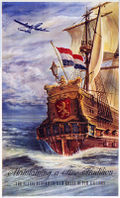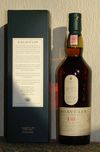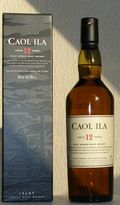Whiskey Equivalence
“You are in luck. The spirit is upon me.”
– User:Dimario on Writing about Whiskey Equivalence
Whiskey Equivalence is teh universal unit of measure. The basic axiom for this modern-day Holy Grail is that all things and all un-things expose a measurable quantity the value of which can be expressed in Whiskey. Thus rendering comparison possible between such uncomparable quantities as apples and berries, or butterfly sneezes and the abundance of UTF-8 characters on the intarwebs. As in Aaaaa Chououou makes three times 灵山.
History[edit | edit source]
The Whiskey Equivalence was first mentioned april 1635 in the Captain's log by Cornelis van der Decken, Master of the Flying Dutchman, a 16-th century tall ship suffering from bad press through-out its entire existence, and subsequent non-existence. Van der Decken later acquired some negative connotations when Gepetto Verdi Rudolph Wagner wrote a most entertaining opera about the alluded goings-on, called "Das Liegende Hollander" (The Lying Dutchman)
The Whiskey Equivalence was actually born as the Gin Equivalence, due
to the fact that 16th-century Dutchies did not know anything about Whiskey, and habitually abused the inferior Gin fluid instead. Being the typical 16th-century entrepreneurs that they were, the Dutch sought after a universal system of valuing very different things against a common framework. In doing so, they adopted a very early form of the scientific method, in that they actually laid out requirements before starting to define a solution. Nor were they shy about sharing the accumulated findings. The image to the left of this paragraph shows a fragment from a 16-th century instruction pamphlet recovered in 1997 by Jacques Cousteau from the wreckage of the Nieu Amschterdam, a proud three master that sank on her maiden voyage. For those of you who are not well-versed in Dutch 16-th century hand-writing (particularly after having been submerged for almost four hundred years - the hand-writing that is, not you, har har, snicker), here is a preliminary translation:
"When, in the Course of Bartering or Trading of Goods, the Buyer and the seller Cannot Conclude the Buisiness at Hand due to a Lack of Agreement upon the Value of the Goods and/or the Value of the Silver Florin in Relation to Said Goods, a Committee will be Nominated to Establish the Value of the Intended Transaction and to Express the Values of both Goods and Compensation against the Common Standard Of The Gin Equivalence. The Committee will Consiste of these Members:
I The Captain of the Trading Shippe
II The First Mate of the Trading Shippe
III (...illegible...) Shippe
IV His High Eminence The Proconsul For The Islands Or A Representative Thereof As Appointed By The Captain of the Trading Shippe
V A representative of the inlanders, appointed by the Captain of the Trading Shippe.
During Negotiation Sessions, it Falls within the Duty of the Trading Shippe to Supply a Hospitable Setting that Will be Conductive to a Swift Resolution of Differences in Opinion. Although Our Lord The High Admiral in Charge of the VOC Frowns upon Openly Bribing, It is Considered a Valour and Duty of Each Trading Shippes Captain to Supply Ample Quantities of Ginne and Rumme to all Participants during the Course of Negotiation, And Particularly so to the inlanders representatives, in Order as to Improve their Health as a Side-effect."
By resolving conflicts about fair trade in a democratic way, the Dutch made themselves hugely popular in the East- and later the West Indies. Much of this success can be attributed to the invention and impartial implemetation of the Gin Equivalence, which set an objective standard for valuing commodities and services against a universally applicable, and well-understood, standard.
Scientific Definition[edit | edit source]
After a rather lackadaisical existence throughout the 16th and 17th centuries, with many local implementations of the concept (including the Tequilla Equivalence in Mexico, which lead to a
rather heated scholarly war dispute on with versus without the worm), it was decided by the Academí Française to lay down the law and procure a scientific definition for what was then known throughout the empire as the "Équivalence du Cognac". After Napoleon and with the on-set of an European scientific community, the name was finally standardised to "Whiskey Equivalence", in honour of the Scottish scientist Lord Balfour who indeed put in a lot of time researching the phenomenon.
Anyhow, the concept behind the Whiskey Equivalence (or WE as abbreviated in the Système International) is simple yet brilliant: the perceived value of any goods, seizable or abstract, service, and/or commodity is expressed as an amount of Whiskey, called the "Whiskey Equivalence" of said good, service, abstract or commodity.
Toward a Unified Theory[edit | edit source]
The focus of study of Whiskey Equivalence today lies within the perceived value part of the definition. Physicists throughout the world are working on establishing a standard set of Objective Evaluation Rules (OER) that hopefully will clarify things once and for all. Current hopes of a world-wide standard heavily lean towards the theory of Grand Retrofitted Unified Whiskey Equivalence, as pursued by the GRUWE initiative. Loosely speaking, GRUWE intends to incorporate Whiskey Equivalence into the various other Grand Unification Theories that with varying degrees of success explain the relationship between the other five known Basic Forces of Physics (Electromagnetism, Gravity, the Weak and the Strong Interaction, and Random Stuff).
Some physicists argue that Whiskey Equivalence is not a basic law in itself, but an effect that can be deduced by applying the proper rules of interaction to other basic forces of Nature. Einstein, shortly before being hospitalized in 1954, published an article that explored the ramifications that would follow from such a view on reality. His conclusion was that "God does not play the Dice".
In the debate that arose interpreting this conclusion, two mayor factions manifested themselves: Those whome say "everything is determined by statistics, so it follows that anything not being determined by statistics simply cannot exist" versus those whome say "But what if the dice were loaded? Would God then play them? In other words, what if Evolution was a process influenced by some kind of Intelligent Design?" Applied to the position of Whiskey Equivalence in modern-day physics, it boils down to either accepting that the remarkable convenience of having Whiskey Equivalence as a universal comparator is just that: a remarkable convenience, versus acknowledging the fact that there is nothing remarkable about this convenience, it was built into the Universe by its Designer in order for us to profit from it.
Whiskey Equivalence and you[edit | edit source]
In case you are now very excited and roaring to go, stretching the consciousness for ways in which you personally may further the acceptance of the Whiskey Equivalence, here are some pointers:
- Be aware of opportunities to convert values measured in un-related quantities to WE.
- Proclaim values you hold dear to to have a WE reading. E.g. "My daughter should not go out with white boyz" equals 0.8725 WE.
- Compare unrelated thingies by converting them to WE's first. E.g. "Christmas is far worse than losing my job, Christmas is like 20.01 WE and losing my job would hurt me a mere 13.03 WE".
- Ask your wife or lover where they stands in the WE matter.
- Write to your local congressman about it.
- Threaten the pubs/landlords in your local area to establish their cost/performance ratio via Whiskey Equivalence.



